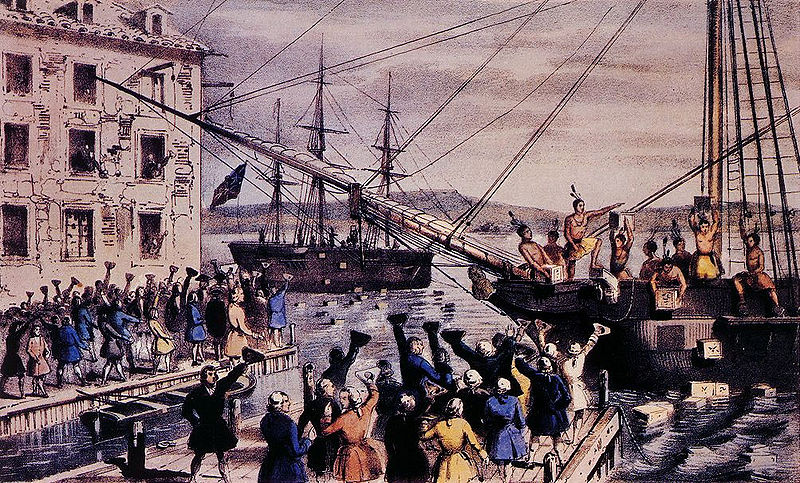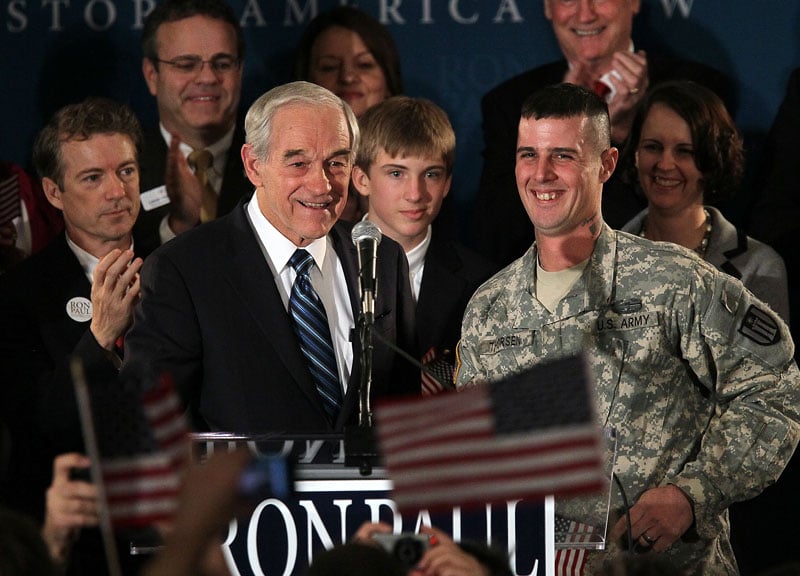The Treatment of Ron Paul and Stephen Harper in Engineering the Political Economy of North America
by Anthony J. Hall
Deconstructing the Tea Party
For consistently opposing abuses of power in the realm of banking and military invasions, Ron Paul has garnered the reserved respect and appreciation of many on the left who agree with his anti-imperialism and well as some aspects of his diagnosis of the financial debacle. But this marriage of convenience has major limitations for those who believe in the importance of the state as an instrument to promote and safeguard the collective wellbeing of the whole society, but especially its most disadvantaged members.
Ron Paul’s particular form of conservatism denies group rights by putting all the emphasis on individual liberties. This propensity shows up most clearly when it comes to Ron Pau’s role as an inspirational figure in the genesis of the Tea Party movement.[i] The Tea Party movement began independently of the Republican Party. The most recent cycle employing the imagery of Anglo-America’s most seminal tax revolt originated in 2006 in an event entitled the Boston Tea Party for 9/11 Truth.[ii]
[youtube IHhQ71I_fwI]
[vimeo 30397714]
A former director of the US Star Wars program, Lt.-Colonel Robert Bowman was prominent among those who organized a ritual throwing overboard into Boston Harbor of the inadequate and deeply flawed report of the 9/11 Commission. The aim of this display of contempt for the government’s spurious 9/11 cover story was to dramatize the need for American patriots to reject the frauds imposed from above by dishonest, illegitimate, and unaccountable authorities.
What began as a genuine populist effort to criticize America’s ruling cabal was in due course co-opted by the some of the elites the tea partiers sought initially to expose, discredit, and displace. The notorious Koch brothers used the carrot of funding to help divert the movement away from its founding principles. Similarly, the extensive coverage of the Tea Party by the psy ops specialists at Fox News helped transform the spectacle into a cartoon-like caricature affording major publicity to extremists who disregarded the founding critique of the organizers of the Boston Tea Party for 9/11 Truth.
A focus on the Tea Party helps put in the forefront differing orientations to conservatism as reflected in the different constitutional foundations of Canada and the United States. The issues raised in and around the Tea Party movement help draw attention to the historical background of the political agendas advanced by Stephen Harper, Ron Paul, different factions of the US Republican Party, and the suppressed Red Tories of Canada. By bringing to the surface fundamental issues about the nature of power, the sources of legitimacy and the substance of self-government, a focus on the Tea Party also sheds light on the role of elections and election fraud in the selection of our governors.
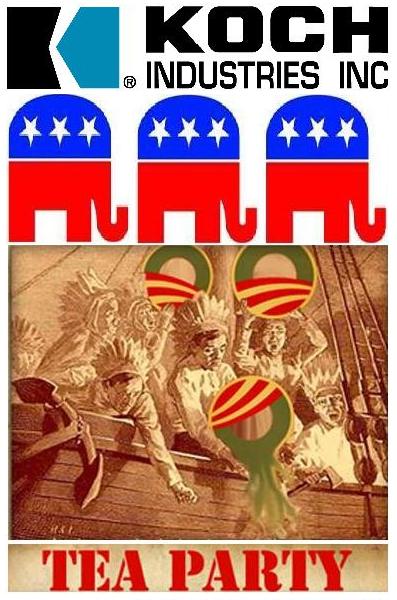 Because the Tea Party invokes the memory of events that led to the birth of a nascent superpower from the womb of an old imperial system, the controversies it generates raise important questions about the relationship between empire and liberty, law and rebellion, the individual and the group, the public sphere and the personal realm. The Tea Party puts in the spotlight unresolved controversies testing the claims of American exceptionalism— or, as it used to be known, American Manifest Destiny— against the inherent human right of all peoples to exercise self-determination.
Because the Tea Party invokes the memory of events that led to the birth of a nascent superpower from the womb of an old imperial system, the controversies it generates raise important questions about the relationship between empire and liberty, law and rebellion, the individual and the group, the public sphere and the personal realm. The Tea Party puts in the spotlight unresolved controversies testing the claims of American exceptionalism— or, as it used to be known, American Manifest Destiny— against the inherent human right of all peoples to exercise self-determination.
Because he debunks the basis of the historic claims of American Manifest destiny as pressed forward globally since the Second World War by the US Armed Forces, the CIA and other agencies of so-called national security, Ron Paul extends to a new constituency of predominantly White Americans a trajectory of agitation associated with decolonization? Might we even go so far as to posit that Ron Paul continues the heritage of those who have called for the end of empires in the tradition of Gandhi, Kwame Nkrumah, and Canada’s prophet of the Fourth Word, George Manuel?
In 1773 the original tea partiers conducted a ritual throwing of East India Company tea into Boston Harbor in order to protest the new British imperial tax on this product. Some of the protesters dressed up as Mohawk Indians. It is unclear why they did so. Where they seeking to disguise themselves to avoid recriminations or did they don Indian apparel in the effort to present some sort of idealized picture of North American freedom? Is it possible that the tea partiers were consciously connecting their tax revolt to the intended use of the taxes to pay for the protection of Indian lands and Indian people in the backcountry of North America?
 No matter whether our focus is on the events of 1492, 1776, 1867, or 2001, the fate delivered on Native Americans by a changing array of regimes and polities raises profound questions that speak directly to the some of the most contentious and consequential issues of our time. The fate of North America’s Indigenous peoples speaks to the persistence of colonial styles of human interaction that keep being perpetuated in spite of the USA’s preemption of the British Empire and in spite of the formal dismantling of all the European empires in the decades following the Second World War.
No matter whether our focus is on the events of 1492, 1776, 1867, or 2001, the fate delivered on Native Americans by a changing array of regimes and polities raises profound questions that speak directly to the some of the most contentious and consequential issues of our time. The fate of North America’s Indigenous peoples speaks to the persistence of colonial styles of human interaction that keep being perpetuated in spite of the USA’s preemption of the British Empire and in spite of the formal dismantling of all the European empires in the decades following the Second World War.
The history of Europe’s treatment of the Western Hemisphere as its primary frontier of colonization entered a new phase in 1776. Thereafter the settler population indigenized for itself the trajectory of colonization that began in 1492. As the United States moved from transcontinental expansion to hemispheric and then global influence, those directing the conquests of this expanding system of power sought to tame and dominate one frontier after the next. The results are to be seen in the contemporary military, political, commercial and cultural impositions on the lives of many Indigenous peoples throughout the world, but especially those on strategic resource frontiers such as the oil-rich districts of the Middle East and Eurasia.
This ailing neocolonial empire puts the White House, the Pentagon, Wall Street and the CIA headquarters in Langley Virginia at the imperial core of a worldwide regime of mostly covert command and control. Election fraud tied to media deception forms an essential device in the arsenal of tactics used to achieve dominance in the name of an America’s exceptionalist mission to spread democracy. If the Harper Conservatives were installed into power as instruments of this neocolonial project, then it is appropriate to characterize the dominant party in Ottawa as yet another puppet government doing the bidding of the very system of command and control that Ron Paul wants to terminate.
From Indian Wars to the Global War on Terror
As I contend in my two-volume work, The Bowl with One Spoon, disagreements over the treatment of Indian people and Indian lands lie at the very heart of the controversy that led to the secession of the United States from the British Empire.[i] The stakes in this controversy became increasingly large as the realization grew that whoever controlled the westward expansion of Anglo-American settlement across North America would thereby acquire vast wealth and vast influence in the global community. Who would acquire the valuable proprietorships from the transformation of Aboriginal lands into international capital? Who would govern the process of transforming such a rich portion of the globe into individual and corporate property? Who would speak for that portion of the planet Eurocentrically defined as a New World?
In the era of the Seven Years War and the American Revolution some British imperial Red Coats, true embodiments of conservative principles of their time and place, were especially preoccupied with the strategic importance of Indian Affairs. As participants in the mercantilism of the North American fur trade they tended to side with the Indians and against the expansionary designs of pioneer farmers and land speculators whose combined activities tended to make the frontier districts of British North America very violent and unstable places. Sir William Johnson was the most prominent of the Crown officials who proposed innovations to a balance the rights of Indians with the claims of Anglo-American settlers. For his attentiveness to these issues Johnson was named the first Superintendent of Indian Affairs in the northern half of British North America.
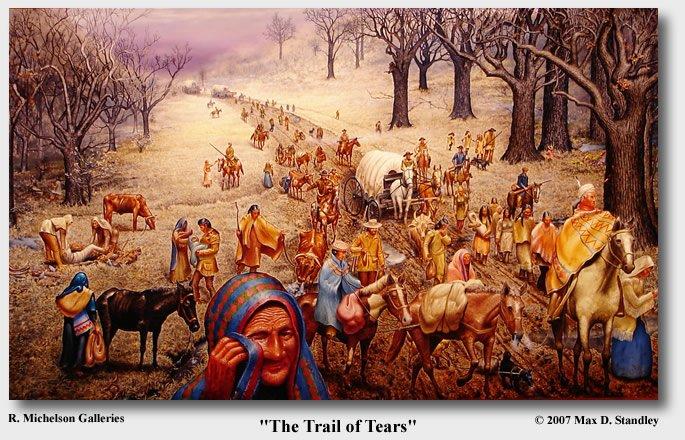
Johnson sought to induce Indigenous peoples on the western frontiers of British North America to accept the claims of the British Empire; to join voluntarily the imperial community of communities based on a rule of law with provisions to recognize and affirm Aboriginal rights through the making of Crown treaties with indigenous groups. In 1763 Johnson’s advice was codified in a Royal Proclamation. This constitutional instrument formed the legal foundation of British imperial Canada, including the plan for creating a new Crown polity to be known as Quebec. In a provision that recognizes and affirms the existence of Aboriginal and treaty rights, the Royal Proclamation of 1763 was renewed in 1982 with the patriation from Great Britain of Canada’s constitution.
Because it sought to outlaw conquest and genocidal wars in the western expansion of Anglo-American settlements, the Royal Proclamation can appropriately be compared to the Emancipation Proclamation signed into law exactly once century later by Abraham Lincoln, the US president who became the great defender of federal authority in the era of the US Civil War. The Republican Party began in the 1850s with the goal of preventing the westward spread of the institution of slavery into new territories and states created in the USA after the annexation through conquest of the northern part of Mexico.
The end of slavery in the United States came three decades after slavery’s abolition throughout the British Empire. Long before the British government outlawed the slave trade and then slavery itself the Royal Proclamation of 1763 addressed the original human rights violations embedded in the making of the Americas beginning in 1492 as a frontier of European colonization.
Following the British defeat of French imperialism in North America, the Royal Proclamation outlined a plan for protecting Aboriginal lands in the region of the Great Lakes and the eastern half of the Mississippi Valley until such time as Indian groups freely consented through treaty to give ground to the inevitable expansion of the Anglo-American settlements. There would of course be significant expenses incurred in the plan to regulate the westward-moving frontier by protecting Indian lands until such time as Crown-Aboriginal treaties could be transacted. The Royal Proclamation necessitated, therefore, the raising of new taxes as the basis for a revenue stream to enforce law and order at the interface between Indian Country and the westernmost settlements of the Thirteen Colonies.
 Many Anglo-Americans resented this tax to pay for the enforcement of regulations on the westward expansion of their own societies. They preferred be left free to kill Indians or to terrorize Aboriginal populations into migrating westward so incoming settlers could acquire new territories for Euro-American colonization accompanied by Euro-American regimes of property relations and self-governance. Many of the Euro-American frontiersmen and the land speculators associated with their expansionary march thus preferred deregulated approaches to territorial aggrandizement where few restrictions would prevent the newcomers from implementing their own violent means of transforming earth into property.
Many Anglo-Americans resented this tax to pay for the enforcement of regulations on the westward expansion of their own societies. They preferred be left free to kill Indians or to terrorize Aboriginal populations into migrating westward so incoming settlers could acquire new territories for Euro-American colonization accompanied by Euro-American regimes of property relations and self-governance. Many of the Euro-American frontiersmen and the land speculators associated with their expansionary march thus preferred deregulated approaches to territorial aggrandizement where few restrictions would prevent the newcomers from implementing their own violent means of transforming earth into property.
As it became clear that the newcomers to their territories had devised two very different systems for colonizing Aboriginal lands, Indian people were presented with a choice between a bad and a less bad option. The result was a widespread determination to flex their muscle as Aboriginal soldiers on the side of the Royal Proclamation and of British imperial Canada. Even the partial and imperfect attempts to enforce Johnson’s Royal Proclamation were instrumental in the choice of many Indian groups to align themselves militarily with the conservative side of the American Revolution and the British imperial side of the War of 1812.
The names of Joseph Brant and Tecumseh would figure prominently in this little-understood chapter of North American history that would put the defense of Aboriginal and treaty rights on the conservative side of the ledger. The role of the Red Coats as partners in the development of Crown-Aboriginal treaty alliances underlines the heritage of North American conservatism as an Old World movement prone to align itself with the Old World orientation of Indigenous peoples in their own Aboriginal lands. These alliances are being extended to this day in the form of new Crown-Aboriginal treaties being negotiated in the unceded Indian territories that comprise the largest part of the Canadian province of British Columbia.
It seems axiomatic that genuine conservatives would identify with the struggle of Indigenous peoples to hold at least some of their Aboriginal ground and retain some semblance of the cultural, linguistic and material inheritances from the past in order to pass on this heritage to future generations. Certainly those engaged in this effort to preserve a measure of continuity from one generation to the next are worthy of respect as conservatives. Alternatively there is something very specious about the spectacle of those trying to uproot and destroy very old societies when they claim that their actions are motivated by conservative philosophy.
Countering the Currents of the American Imperium
The Royal Proclamation of 1763 is the founding manifesto of the Red Tory school of North American conservatism. This form of conservatism emphasizes the values of compromise and negotiation with Indigenous peoples over the imperatives of conquest and resource theft through genocide. The formal rejection of the conservatism of the Royal Proclamation was codified in those provisions of the Declaration of Independence of July 4, 1776 that condemned King George for “endeavour[ing] to bring on the inhabitants of our frontiers, the merciless Indian savages whose known rule of warfare is an undistinguished destruction of all ages, sexes and conditions.”
Seen in this light, the Declaration of Independence can be conceived as a direct response to the Royal Proclamation of 1763. Where the authors of the Royal Proclamation attempted to outlaw conquest as a means of expanding empire, the founders of the United States sought to justify conquest in anticipation of the imperial republic’s transcontinental expansion. Similar justifications for conquest would be elaborated on one frontier after the next in the rise of to the United States to the status of the world’s dominant superpower.
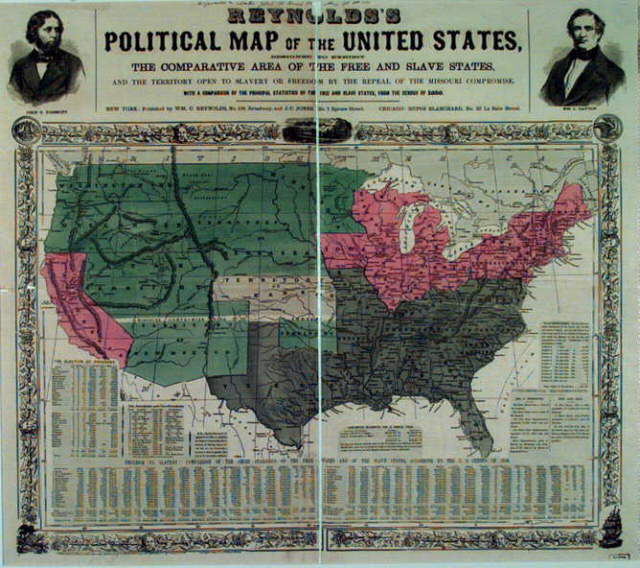 Beginning on July 4, 1776, the racial profiling as criminals of those Indigenous peoples inhabiting the lands and resources about to be ingested into the United States established patterns for rationalizing ongoing resource grabs and land thefts. The descendants of the merciless Indian savages referred to in the Declaration of Independence would become Red communists in the twentieth century and the largely manufactured Islamic enemy of the twenty-first century.
Beginning on July 4, 1776, the racial profiling as criminals of those Indigenous peoples inhabiting the lands and resources about to be ingested into the United States established patterns for rationalizing ongoing resource grabs and land thefts. The descendants of the merciless Indian savages referred to in the Declaration of Independence would become Red communists in the twentieth century and the largely manufactured Islamic enemy of the twenty-first century.
The descendants of the merciless Indian savages would include the so-called “unlawful enemy combatants” of the Global War on Terror. To be designated as such by the US president without any means of recourse is the antithesis of due process, the antithesis of law. The Global War on Terror pictures the whole world as a US police state where human beings can be reconstituted anywhere, anytime by executive order as subhuman, as organisms subject to indefinite incarceration, torture and death. This wanton assault on the principles of universal human rights extends to transnational frontiers the power grab of the US executive branch generally and of the US Commander-In-Chief more specifically.
Accordingly the Red Tory tradition of Canadian conservatism originates in very different orientations to law and empire than what passes for conservatism in the United States, a polity born of the revolutionary rejection of the ideals embodied in the career of Sir William Johnson and the Royal Proclamation of 1763. The Red Tory tradition did not die after the emergence of the United States from British North America. Rather the Red Tory tradition continued to evolve in the Crown’s remaining North American polities, flowing eventually into the political culture of the Progressive Conservative Party of Canada.
In more recent time Canada’s Red Tories have not been afraid to direct the resources of the state to the realization of big projects like the building of a transcontinental railway, creating a national public broadcaster, and developing hydroelectric power as a publicly-owned asset to advance the public interest and the common good. Thus the Red Tory tradition embodies a genre of conservatism opposed to many of the libertarian notions promoted by Ron Paul.
Stephen Harper’s Conservative Party of Canada was formally concocted in 2003. Harper’s Alliance Party sought to block the renewal of the Red Tory tradition of conservatism by ingesting the remains of the Progressive Conservative Party to produce a Canadian clone of the US Republican Party. Harper’s so-called Conservative Party gained momentum by inducting Canada with much help from the North American media into the expansionary ethos inherent in the 9/11 Wars. Indeed, the 9/11 Wars established the context for the political ascent of Stephen Harper as a dependable agent of Anglo-American-Israeli-NATO aggrandizement through the conquest.
Harper’s ideological roots, therefore, lie not in the conservatism of Sir William Johnson and the Royal Proclamation. They lie rather with expansionary mystique of American Manifest Destiny as popularized in the cult of Daniel Boone, James Fenimore Cooper’s Leatherstocking, Buffalo Bill’s Wild West Show, Davey Crockett, and the Hollywood Westerns starring the neo-conservative hero of deregulation, Ronald Reagan. Harper’s political pedigree lies in the whiggish tradition of those who founded the United States in a secessionist movement remembered today as the American Revolution. Harper continues the trajectory, therefore, of those seeking to push aside the Royal Proclamation’s legal impediments to unregulated western expansion and then global dominance through the activities of the US Armed Forces, its proxies, and transnational companies that put the war machine at the core of the political economy of the United States.
Ron Paul’s Campaign to Counter the Criminality of the Imperial Presidency
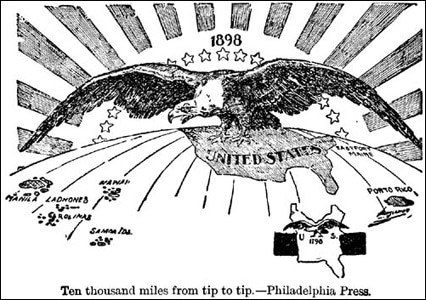 The direct extensions of the Indian wars in North America are the illegal invasions and occupations of the Aboriginal lands of Indigenous peoples in Afghanistan and Iraq. If the Israeli architects of US foreign policy get their way, Iran will be the next frontier in the anti-Islam wars of aggression initiated after 9/11. In pushing the eastward spread of Jewish strongholds into the occupied territories that the UN designated in 1947 as the domain of Palestinian nationhood, the Isreali settler state is reenacting many attributes of the violent US expansion into Indian Country following the American War of Independence.
The direct extensions of the Indian wars in North America are the illegal invasions and occupations of the Aboriginal lands of Indigenous peoples in Afghanistan and Iraq. If the Israeli architects of US foreign policy get their way, Iran will be the next frontier in the anti-Islam wars of aggression initiated after 9/11. In pushing the eastward spread of Jewish strongholds into the occupied territories that the UN designated in 1947 as the domain of Palestinian nationhood, the Isreali settler state is reenacting many attributes of the violent US expansion into Indian Country following the American War of Independence.
Stephen Harper’s embrace of an agenda of unlimited Anglo-American-Israeli-NATO wars of aggression stands in stark contrast to the anti-war policies of Ron Paul. On the campaign trail Ron Paul has made it a priority to condemn those who propose attacking Iran as a new frontier of American and Israeli military adventurism. The fact that Ron Paul’s position is receiving so much support from within the past and present personnel of the US Armed Forces has enormous implications.
The decision of so many current and former soldiers to back Ron Paul’s campaign with substantial financial contributions and with boots on the ground in the February 20th rally in Washington DC sends a very clear signal. It indicates that a substantial portion of America’s Armed Forces are rebelling against the kind of executive orders that again and again put them in harm’s way without a clear legal or moral framework for their military actions. Military operations undertaken without authorization from Congress or the UN Security Council put US soldiers again and again on the wrong side of international criminal law. Like those giving military orders from perches in the Pentagon, White House and CIA, the soldiers on the ground are made prime candidates for future prosecution for war crimes, crimes against humanity, and crimes against the peace. American soldiers face double jeopardy as invaders on the battle field and as agents of the rampant illegality for which the imperial presidency of the United States.
The soldiers’ support of the Ron Paul’s campaign can be pictured as part of a larger process where key components of the US Armed Forces seem to be rejecting the unconstitutional role being hoisted on them as agents of martial law within the United States. Not surprisingly many US soldiers are revolting against a regime that would turn the instruments of war against US citizens, against their own families, friends and communities.
The prospect of this internalization of warfare increases as a corrupt system of banking puts more and more citizens of diverse backgrounds in positions similar to those of dispossessed and disentitled Indians. The kleptocratic origins of the New World Order that began in 1492 have thus been gradually democratized so that even the modest property holdings of North America’s middle class have become objects of theft for those whose licenses to steal are derived from the monopoly powers invested in the US Federal Reserve. Although the Canadian government and thus the Canadian people technically own the Bank of Canada, its governors have opted to replicate American banking practices. They have veered away from the option of growing the Canadian economy by issuing new currency not tied to new debt with compound interest.
A major instrument in this slide into the political economy of martial law is the National Defense Authorization Act of 2012. It empowers the US Armed Forces to detain US citizens without trial and to hold them in indefinitely in detention camps. Raising the alert on the implications of this new law, Paul has observed, “When the bar is low enough to include political enemies, our descent into totalitarianism is virtually assured … the National Defense Authorization Act … accelerated it significantly.”[i]
[youtube -olNr4UuVqY]
http://www.youtube.com/watch?v=-olNr4UuVqY
[i] The first volume of The Bowl with One Spoon is The American Empire and the Fourth World. The second volume is Earth into Property: Colonization, Decolonization, and Capitalism. Both are published in Montreal by McGill-Queen’s University Press, 2005, 2010.

Anthony Hall is a Professor of Globalization Studies at the University of Lethbridge in Alberta Canada where he has taught for 25 years. Along with Kevin Barrett, Tony is co-host of False Flag Weekly News at No Lies Radio Network. Prof. Hall is also Editor In Chief of the American Herald Tribune. His recent books include The American Empire and the Fourth World as well as Earth into Property: Colonization, Decolonization and Capitalism. Both are peered reviewed academic texts published by McGill-Queen’s University Press. Prof. Hall is a contributor to both books edited by Dr. Barrett on the two false flag shootings in Paris in 2015.
Part II was selected by The Independent in the UK as one of the best books of 2010. The journal of the American Library Association called Earth into Property “a scholarly tour de force.”
One of the book’s features is to set 9/11 and the 9/11 Wars in the context of global history since 1492.
ATTENTION READERS
We See The World From All Sides and Want YOU To Be Fully InformedIn fact, intentional disinformation is a disgraceful scourge in media today. So to assuage any possible errant incorrect information posted herein, we strongly encourage you to seek corroboration from other non-VT sources before forming an educated opinion.
About VT - Policies & Disclosures - Comment Policy

